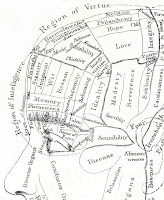Spiritual Psychology

I stumbled upon a couple of fascinating studies on spirituality and its association to mind and behavior. I provide snippets of the abstracts and reference links below. Enjoy oh blessed ones!
Johnstone & Glass (2008):
"Recent research suggests that spiritual experiences are related to increased physiological activity of the frontal and temporal lobes and decreased activity of the right parietal lobe. The current study determined if similar relationships exist between self-reported spirituality and neuropsychological abilities associated with those cerebral structures for persons with traumatic brain injury (TBI)."
link
McCullouch & Willoughby (2009):
"Using Carver and Scheier's (1998) theory of self-regulation as a framework for organizing the empirical research, the authors review evidence relevant to 6 propositions: (a) that religion can promote self-control; (b) that religion influences how goals are selected, pursued, and organized; (c) that religion facilitates self-monitoring; (d) that religion fosters the development of self-regulatory strength; (e) that religion prescribes and fosters proficiency in a suite of self-regulatory behaviors; and (f) that some of religion's influences on health, well-being, and social behavior may result from religion's influences on self-control and self-regulation."
link
Johnstone & Glass (2008):
"Recent research suggests that spiritual experiences are related to increased physiological activity of the frontal and temporal lobes and decreased activity of the right parietal lobe. The current study determined if similar relationships exist between self-reported spirituality and neuropsychological abilities associated with those cerebral structures for persons with traumatic brain injury (TBI)."
link
McCullouch & Willoughby (2009):
"Using Carver and Scheier's (1998) theory of self-regulation as a framework for organizing the empirical research, the authors review evidence relevant to 6 propositions: (a) that religion can promote self-control; (b) that religion influences how goals are selected, pursued, and organized; (c) that religion facilitates self-monitoring; (d) that religion fosters the development of self-regulatory strength; (e) that religion prescribes and fosters proficiency in a suite of self-regulatory behaviors; and (f) that some of religion's influences on health, well-being, and social behavior may result from religion's influences on self-control and self-regulation."
link